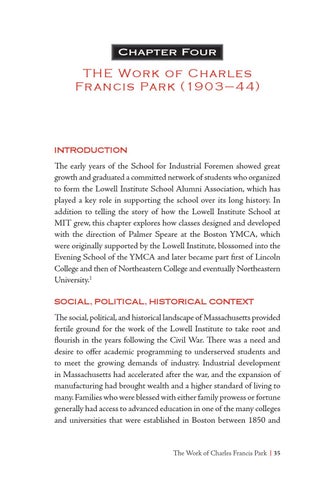Chapter Four
T HE Wor k of Char l es Fr anc is Par k (1903–4 4)
INTRODUCTION
The early years of the School for Industrial Foremen showed great growth and graduated a committed network of students who organized to form the Lowell Institute School Alumni Association, which has played a key role in supporting the school over its long history. In addition to telling the story of how the Lowell Institute School at MIT grew, this chapter explores how classes designed and developed with the direction of Palmer Speare at the Boston YMCA, which were originally supported by the Lowell Institute, blossomed into the Evening School of the YMCA and later became part first of Lincoln College and then of Northeastern College and eventually Northeastern University.1 SOCIAL, POLITICAL, HISTORICAL CONTEXT
The social, political, and historical landscape of Massachusetts provided fertile ground for the work of the Lowell Institute to take root and flourish in the years following the Civil War. There was a need and desire to offer academic programming to underserved students and to meet the growing demands of industry. Industrial development in Massachusetts had accelerated after the war, and the expansion of manufacturing had brought wealth and a higher standard of living to many. Families who were blessed with either family prowess or fortune generally had access to advanced education in one of the many colleges and universities that were established in Boston between 1850 and
The Work of Charles Francis Park l 35
